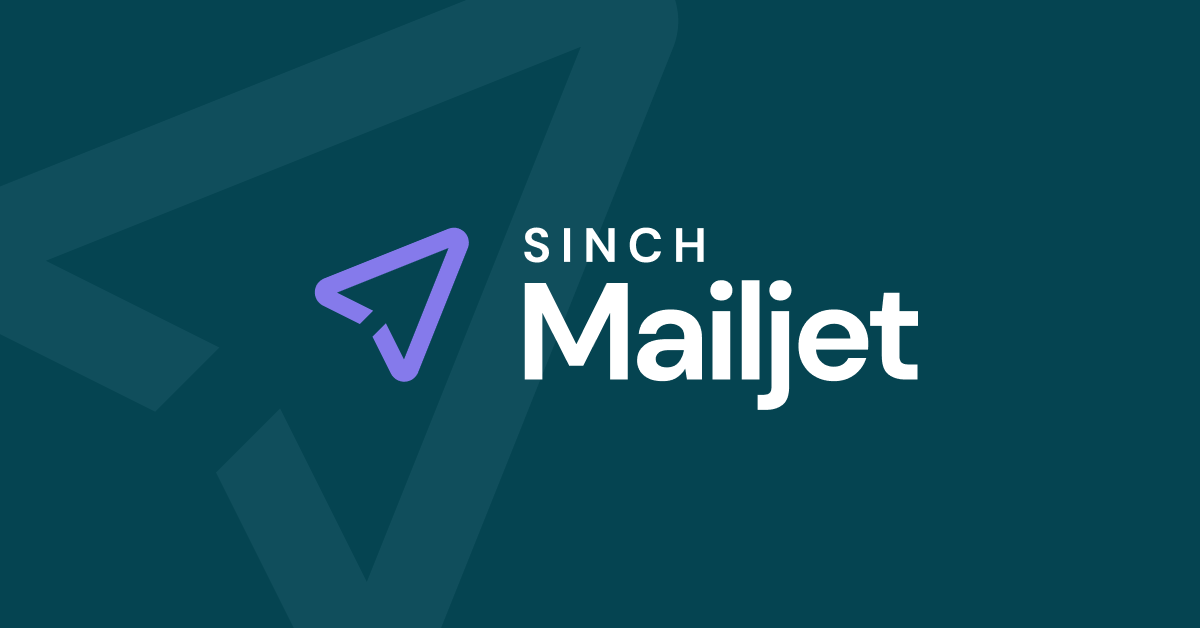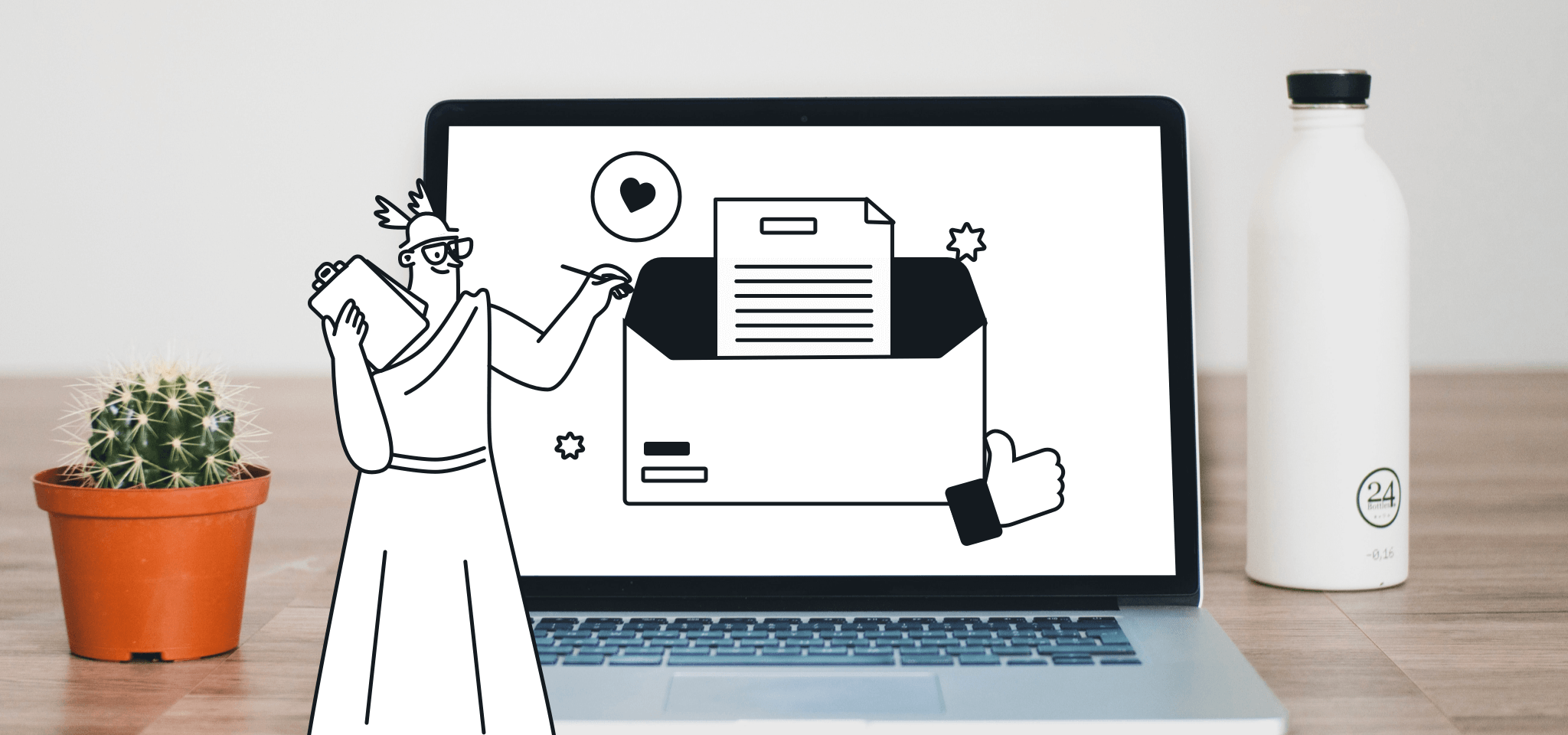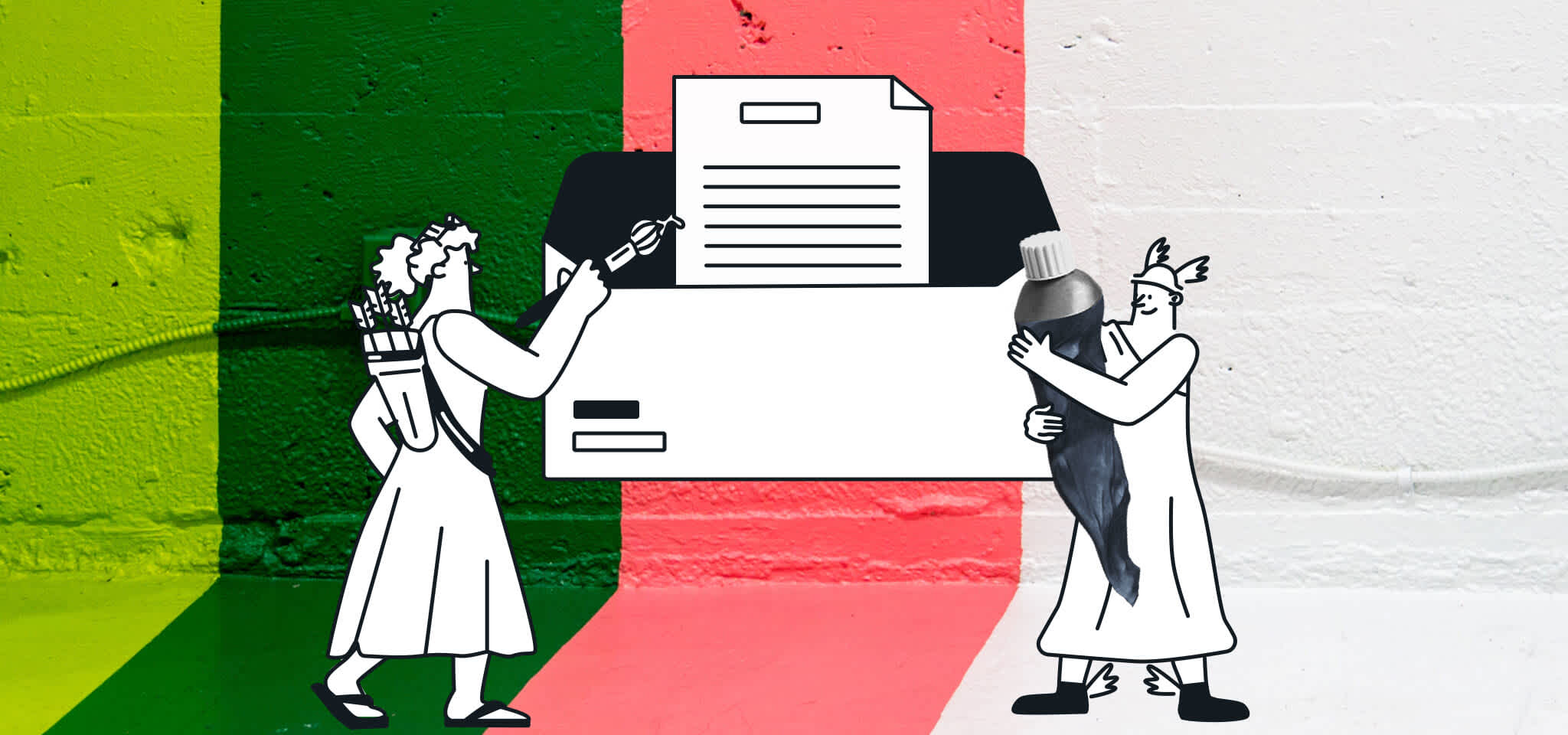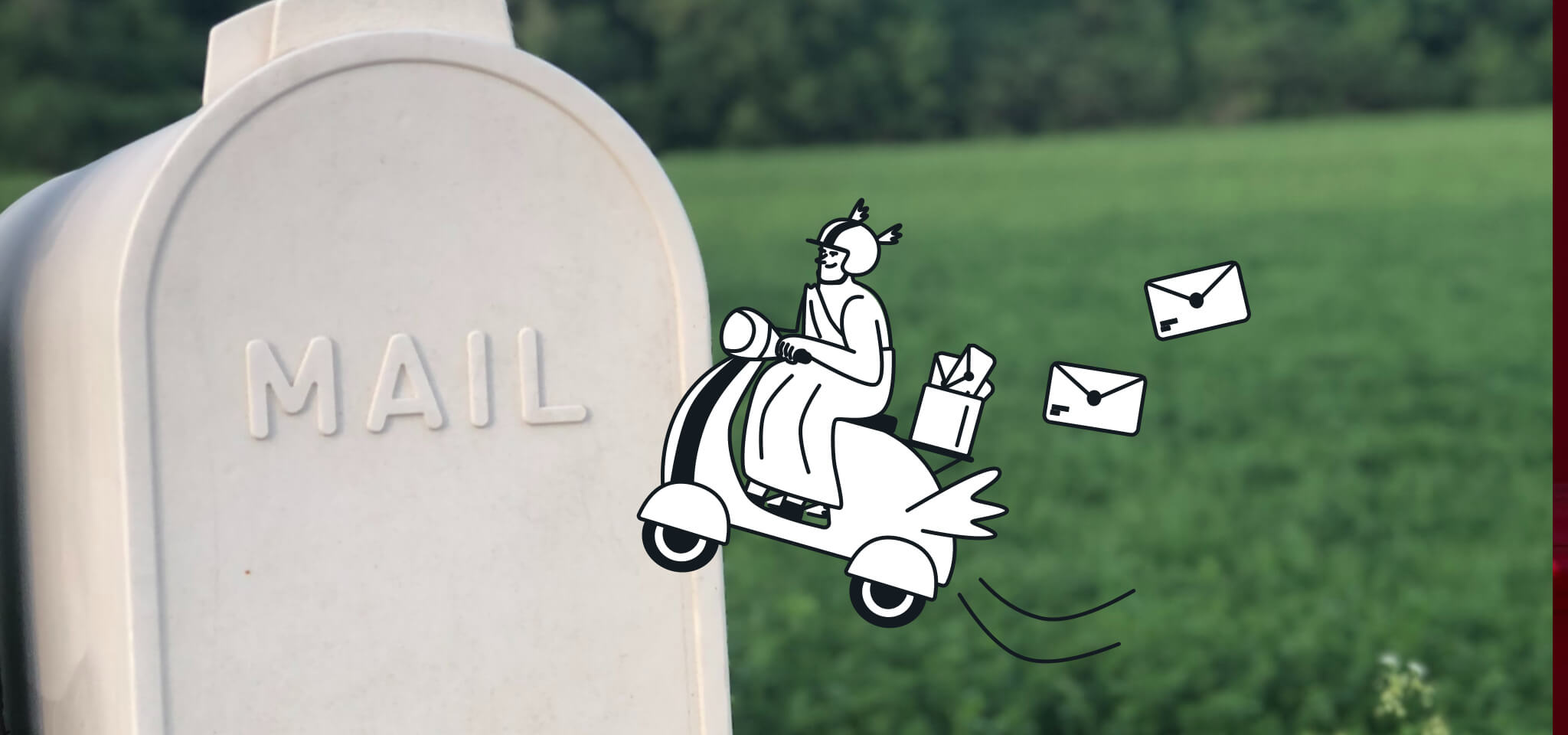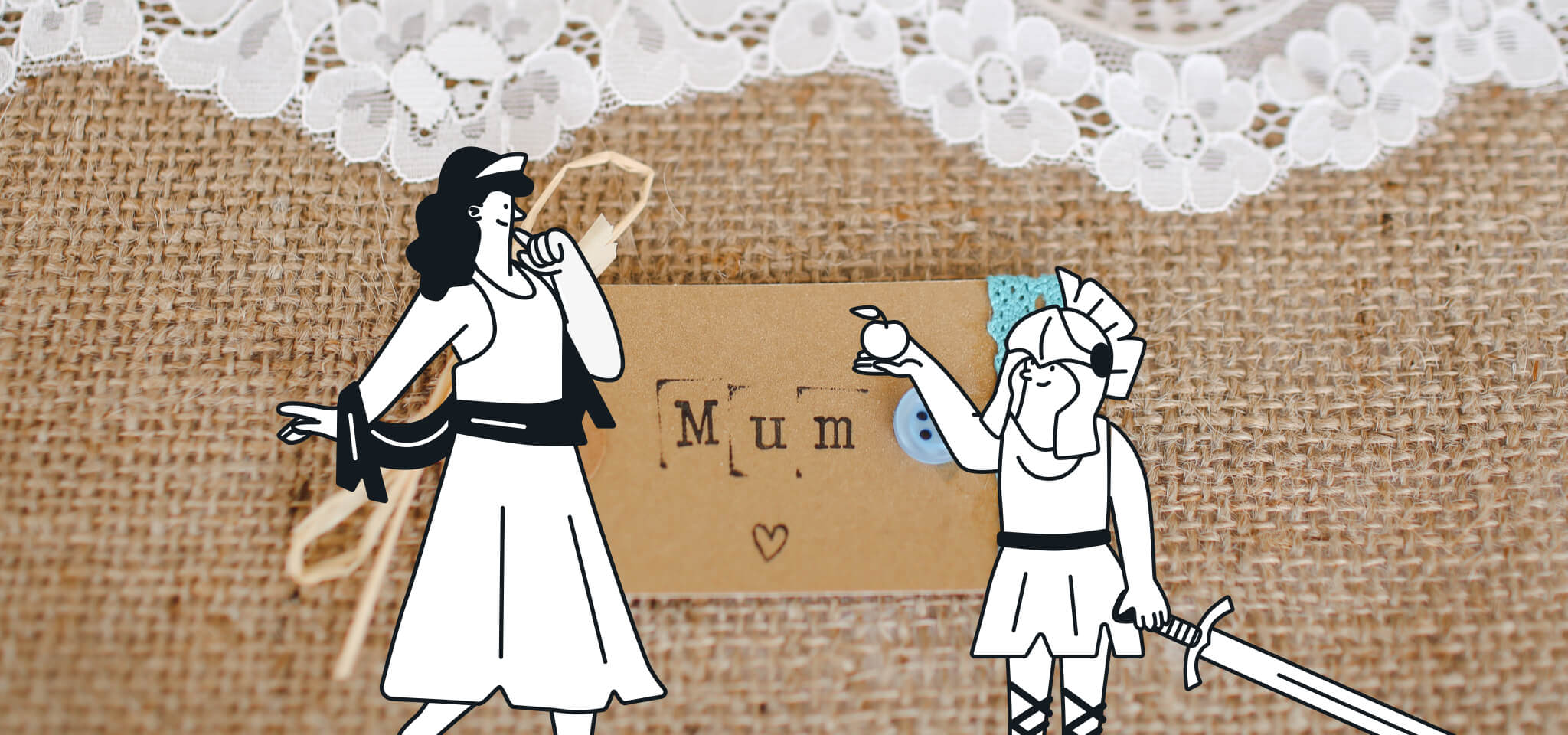Marketing
How to write AI prompts for your email marketing campaigns
Stuck staring at a blank page, wondering how to craft captivating email content? Then let artificial intelligence (AI) give you a helping hand. In this post, we'll teach you how to write effective AI prompts for subject lines, email copy, and calls to action (CTAs) and provide a creative spark to your copywriting.

PUBLISHED ON
At this point you’re probably familiar with AI-powered copy generators such as OpenAI ChatGPT, Gemini, and Sinch Mailjet’s AI Tool. You might have even had the chance to experiment with them yourself, perhaps creating different subject line ideas or CTAs.
However, sometimes the results can sound mechanical. While AI can assist in generating prompts, it's the human touch that adds authenticity, emotion, and brand voice to your messages. Striking a balance between the two is what allows email marketers to get the most out of these tools, while still writing compelling content that resonates with their audience. Which is what we’re here to show you how to do today.
Table of content
#1 Be specific
#2 Think of your audience
#3 Brand voice and tone
#4 Always proofread copy
Campaign ideas
Subject lines and preheaders
CTAs
Event invitation
Webinar series
Reengagement campaign
What are AI writing prompts?
AI writing prompts are instructions (or inputs) that guide AI tools to generate creative text formats such as articles, a short story, social media posts and of particular interest to us, email marketing copy.
However, as British computer scientist Wilf Hey famously coined when working on high-level programming languages: rubbish in, rubbish out. In other words, if you feed the algorithms garbage, that’s exactly what they will spit back out – the information that you enter the AI copy generator heavily influences the quality of its outputs.
So, how do you go about improving your input data? Let’s run through some of the best practices when it comes to writing AI email marketing prompts.
How do write AI prompts (best practices)
#1 Be specific
AI models are trained on massive amounts of data and learn to identify patterns. So, when your prompt is vague, the AI has more freedom to interpret it based on those patterns, which can lead to those undesired outputs we referred to earlier.
For example, if you enter a generic prompt like "write me an email" what do you think the AI copy generator’s response will be? An email about pirates? A love sonnet? Will it be written to an audience of 10-12th graders? Or adults? The results will all depend on the model's understanding of "an email".
Being as clear, concise, and specific as possible with your inputs will help the AI tool generate relevant copy specific to your campaign requirements.
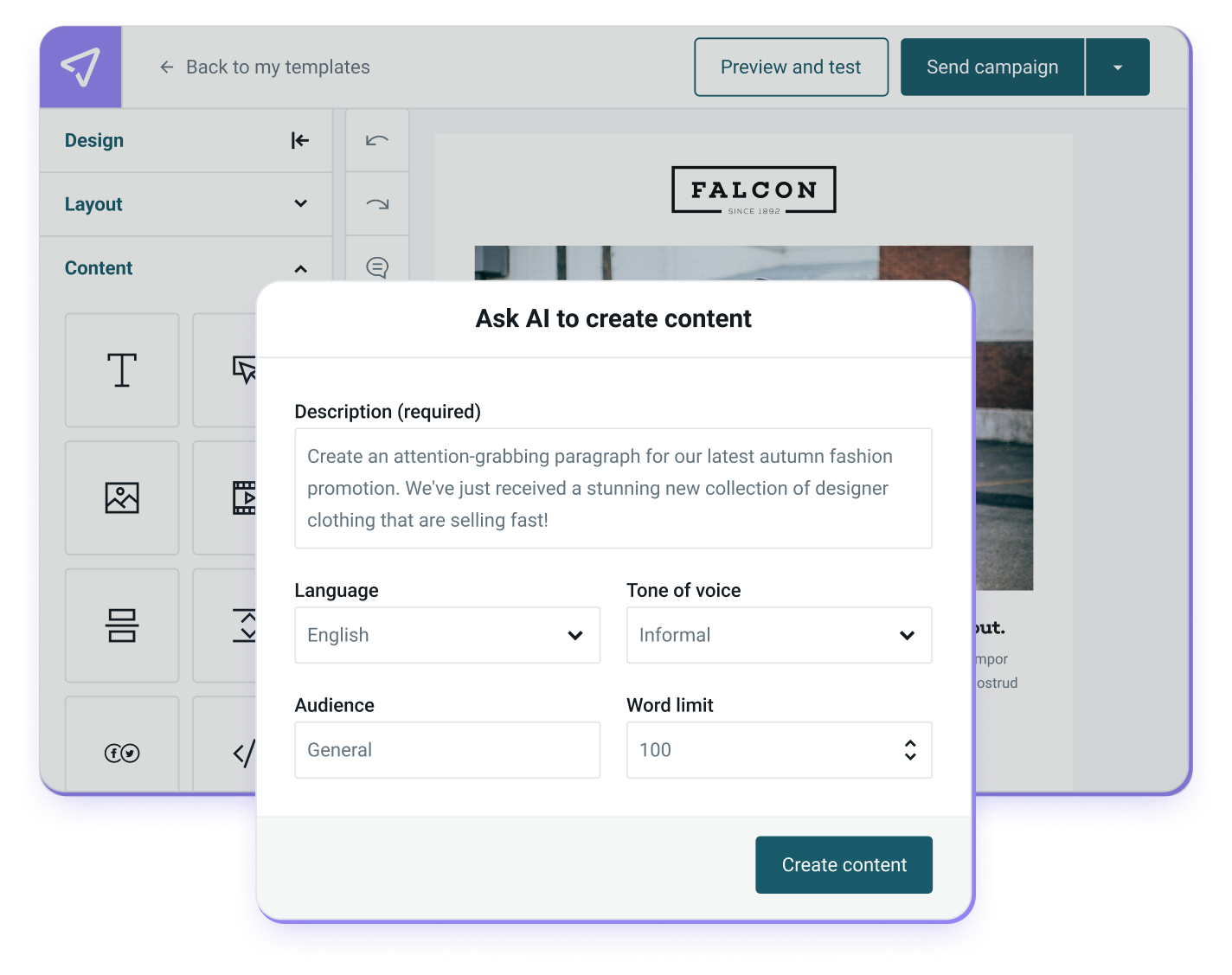
Sinch Mailjet’s AI Copy Generator uses campaign-specific prompts to guide your copy
#2 Think of your audience
The more specific you are about your target audience and demographics, the better the AI copy generator can tailor the content to their interests, needs, and pain points. Generic prompts will result in generic emails – and generic emails, ladies and gentleman, do not get opened.
Just take a look at the results from our new report The path to email engagement 2024 which highlights the importance of a personalized inbox experience:
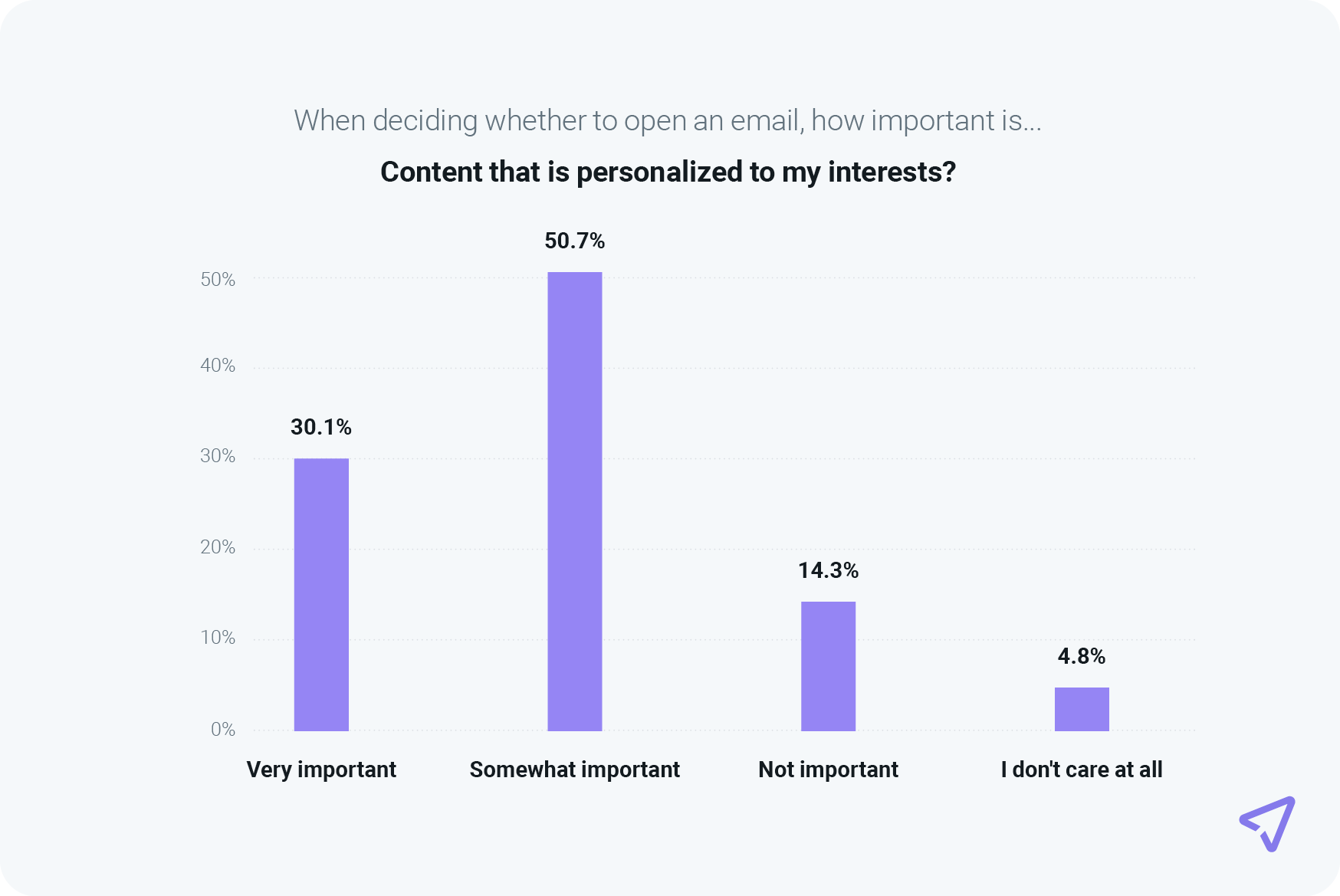
A combined 80.8% of survey respondents said personalized email content is important when deciding whether to open an email.
With a clear audience in mind, you can provide the AI with details like age, interests, and purchase history. This allows the AI to craft content that resonates with their specific needs and wants.
Pro tip: Try asking the copy generator to think as a specific buyer persona. You will find it generates more specific prompts as it attempts to emulate their position and tailor its answers accordingly.
#3 Brand voice and tone
Your brand voice sets you apart from competitors. It’s how customers recognize you, for you. That’s why a consistent brand voice across all communication channels – especially email – builds brand recognition and trust.
So, when you provide clear guidelines about your brand's tone of voice and personality (friendly, professional, humorous, etc.) in your prompts, the AI-generated content will better reflect your unique identity.
This saves you a ton of time when going through and editing the final draft.
#4 Always proofread copy
While these large language models are powerful tools, capable of the type of content generation we only dreamt possible a handful of years ago, it’s still important to remember their responses can be false, inaccurate, and entirely misleading.
So, before trusting in the tool’s ability to craft that perfect subject line or blog post summary, make sure you proofread it first. This is general good practice when it comes to content creation, regardless of whether it was created by an AI tool or not, as you should always check your copy before publishing.
AI writing prompt examples
Now that we’ve gone through some of the best practices for writing AI prompts, let’s look at some concrete examples.
Campaign ideas
We've all been there – staring down at a blank page, willing ideas and words to spring from our mind as if by magic. Writer’s block is real and can be one of the most frustrating parts of email marketing. Fortunately, generative AI can help.
By inputting prompts related to the product or service being promoted, AI copy generators can suggest potential campaign angles, themes, or messaging strategies you perhaps hadn’t thought of.
Imagine you’ve been asked to come up with some ideas on how to promote a new, instant transfer feature for a mobile banking app. The transfers can be made to anyone on your WhatsApp contact list if their phone number is linked to an account on a recognized banking network.
AI writing prompt: Generate a list of email marketing campaign ideas for the promotion of a new instant transfer feature for a mobile banking app. Transfers can be made to anyone on a user's WhatsApp contact list if their number is linked to an account on a recognized banking network. The target audience are mobile bank users (current and non-customers) and the tone of voice should be educational, yet formative.
Let’s input this prompt into Gemini and see what she comes up with:
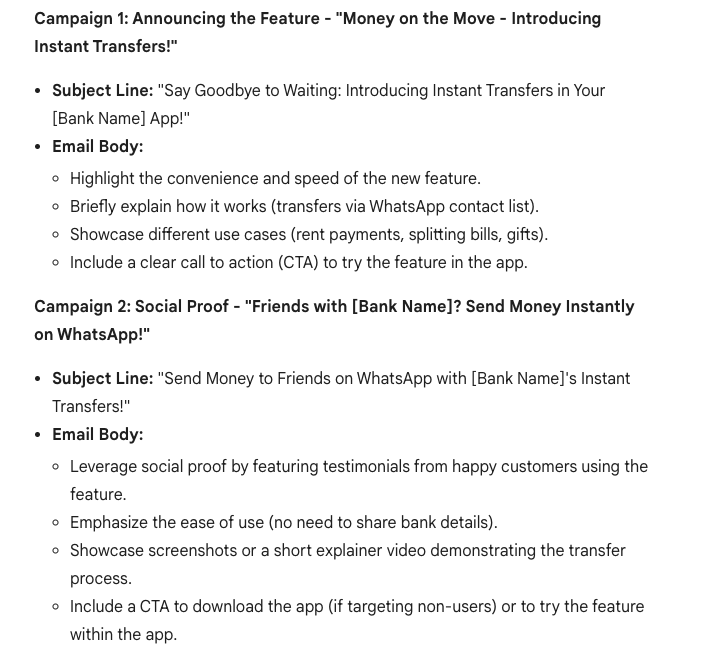
So, the first idea the tool suggests is to run a campaign announcing the feature, highlighting some if its benefits, use cases, and how it works. And the second focuses on a campaign built around social proof.

Some further ideas suggested include running a campaign around a specific use case, such as bill splitting and another addressing a potential customer concern around the app’s security.
What do you think? Not bad, right? Try tweaking your AI writing prompt to see what different results you get and use them as inspiration for your next campaign.
Subject lines and preheaders
Another area that AI can come in clutch for email marketers is with subject lines and preheaders. Now, it could be argued they’re two of the most important elements of any campaign. In a crowded digital space, these snippets of text determine whether someone opens your email and engages with your content, or not. So, getting them right is crucial.
Sticking with the same mobile app instant transfer feature as above, this time we’ll use Sinch Mailjet’s built-in AI Subject Line Generator tool to help us with our copy.
AI writing prompt: Come up with a subject line for a newsletter promoting a new instant transfer feature for a mobile banking app. Transfers can be made to anyone on a user's WhatsApp contact list if their number is linked to an account on a recognized banking network.
Here are some of the results generated from Sinch Mailjet’s AI Subject Line Generator tool after inputting the prompt:
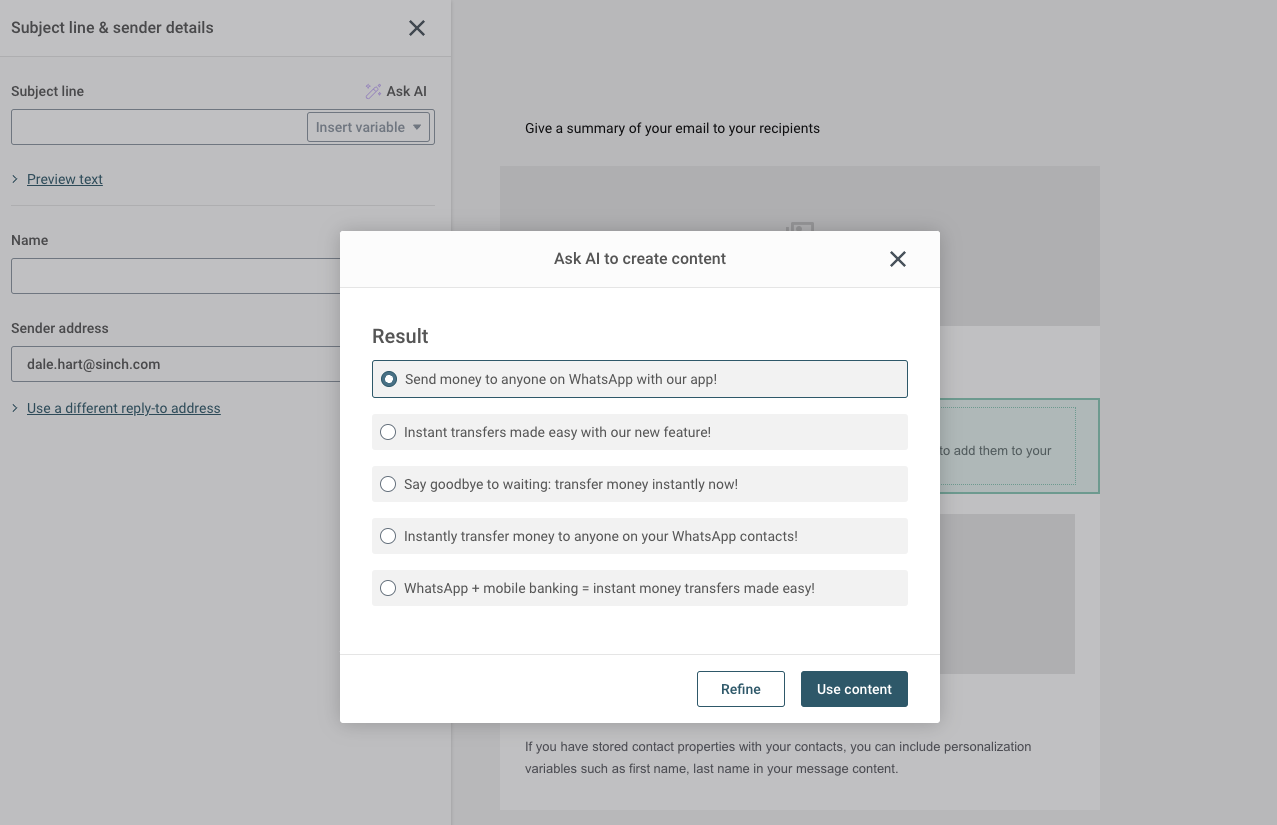
As you can see, five different options are automatically generated based on your AI writing prompt. You can then select which subject line you think best matches your campaign, and it will automatically be added to your newsletter.
Remember, you can always go back and tweak your prompts if you’re not happy with the generator’s results.
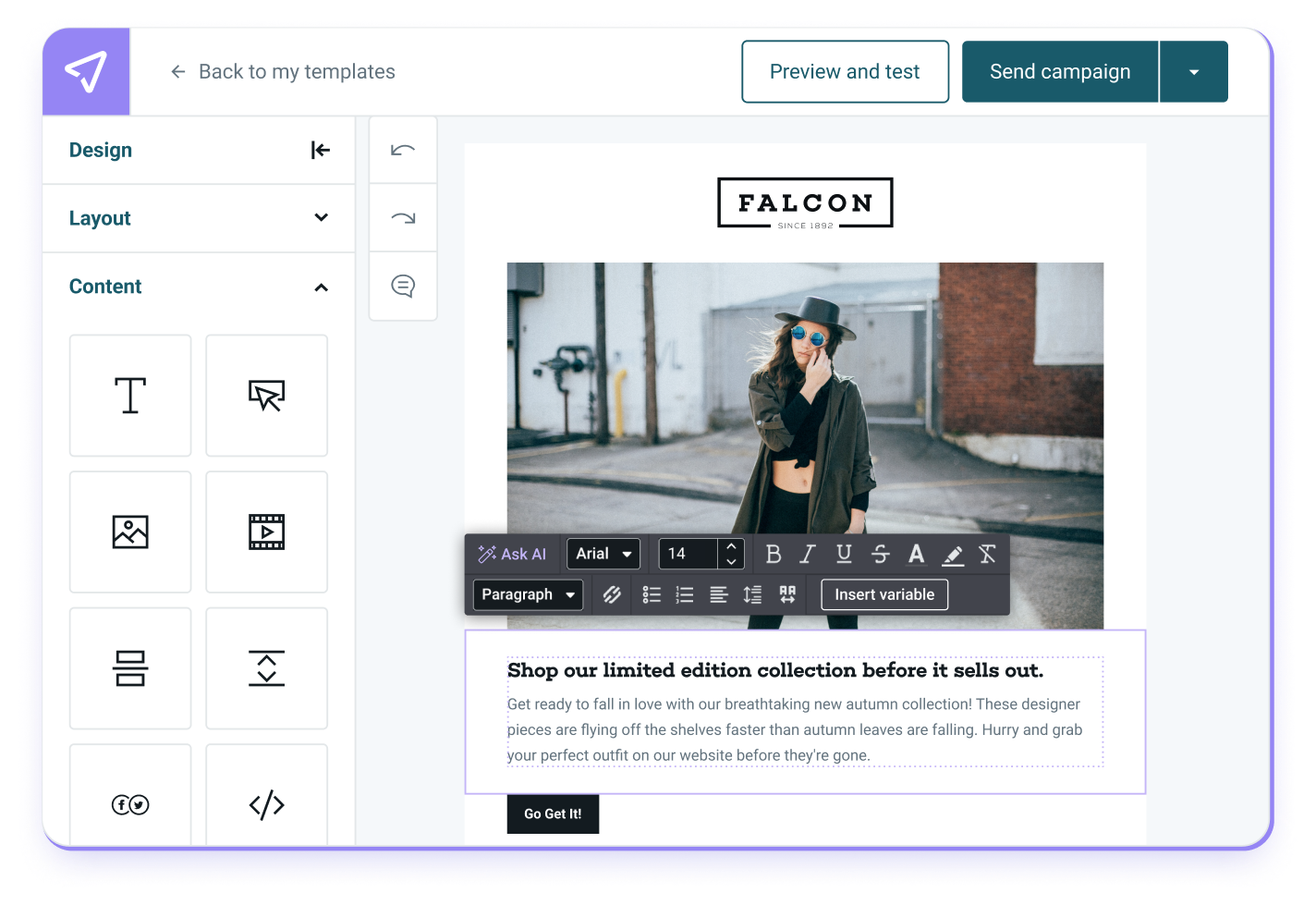
You can access Sinch Mailjet’s AI Subject Line Generator via a button on the fly-out panel within the Email Editor. It's a natural extension of the AI Copy Generator, designed to keep you ahead in the competitive landscape.
CTAs
The ultimate goal of almost every email marketing campaign is to get subscribers to take action after reading, right? This could be anything from making a purchase, signing up for a free trial, downloading a resource, or visiting a specific webpage.
A clear and compelling CTA tells subscribers exactly what you want them to do next, making it more likely they'll follow through and convert. Let’s try feeding Sinch Mailjet’s AI Copy Generator a prompt and see what ideas it comes up with.
AI writing prompt: Write a call for action (CTA) for an email marketing campaign promoting a new instant transfer feature for a mobile banking app. Transfers can be made to anyone on a user’s WhatsApp contact list if their number is linked to an account on a recognized banking network.
Here is the result generated from Sinch Mailjet’s AI Copy Generator tool after inputting the prompt:
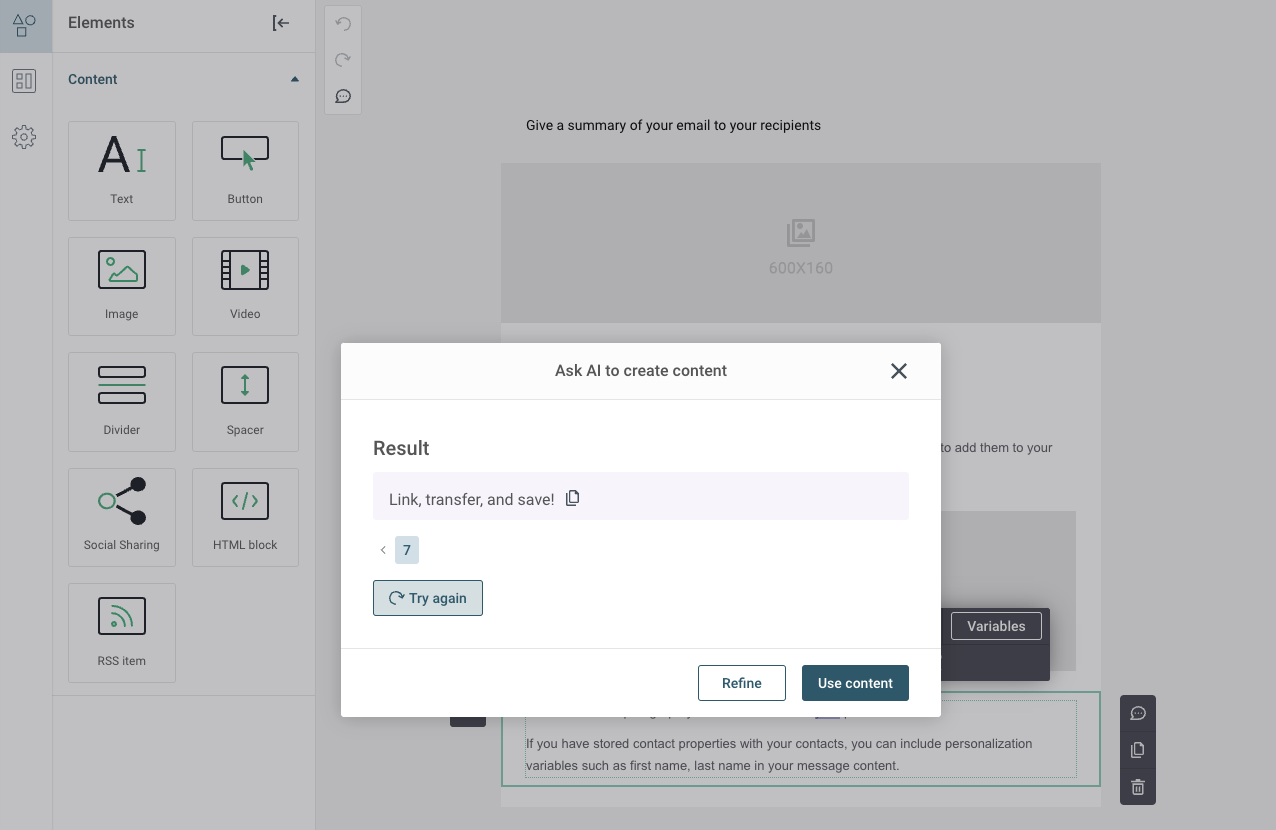
As with the Subject Line Generator, you can automatically add your CTA to the newsletter. You may have also noticed the Try again button. Clicking on this will generate a different CTA based on your prompt. You can then cycle through the various outputs until you find one you think encourages subscribers to act.
Event invitation
A common newsletter type email marketers are often tasked with creating are event invitations. Now, this could be to raise brand awareness, promote a new product or service, or perhaps even to strengthen customer relationships in a particular city.
For continuity, let’s stick with our mobile banking instant transfer theme and create a prompt for an upcoming event celebrating the launch.
AI writing prompt: Write a draft for a newsletter inviting customers to an event celebrating the launch of a new instant transfer feature for a mobile banking app. Transfers can be made to anyone on a user’s WhatsApp contact list if their number is linked to an account on a recognized banking network. The event will take place on April 1st, at the Estadio Benito Villamarín in Seville, Spain.
Here is the result generated from Sinch Mailjet’s AI Copy Generator tool after inputting the prompt:
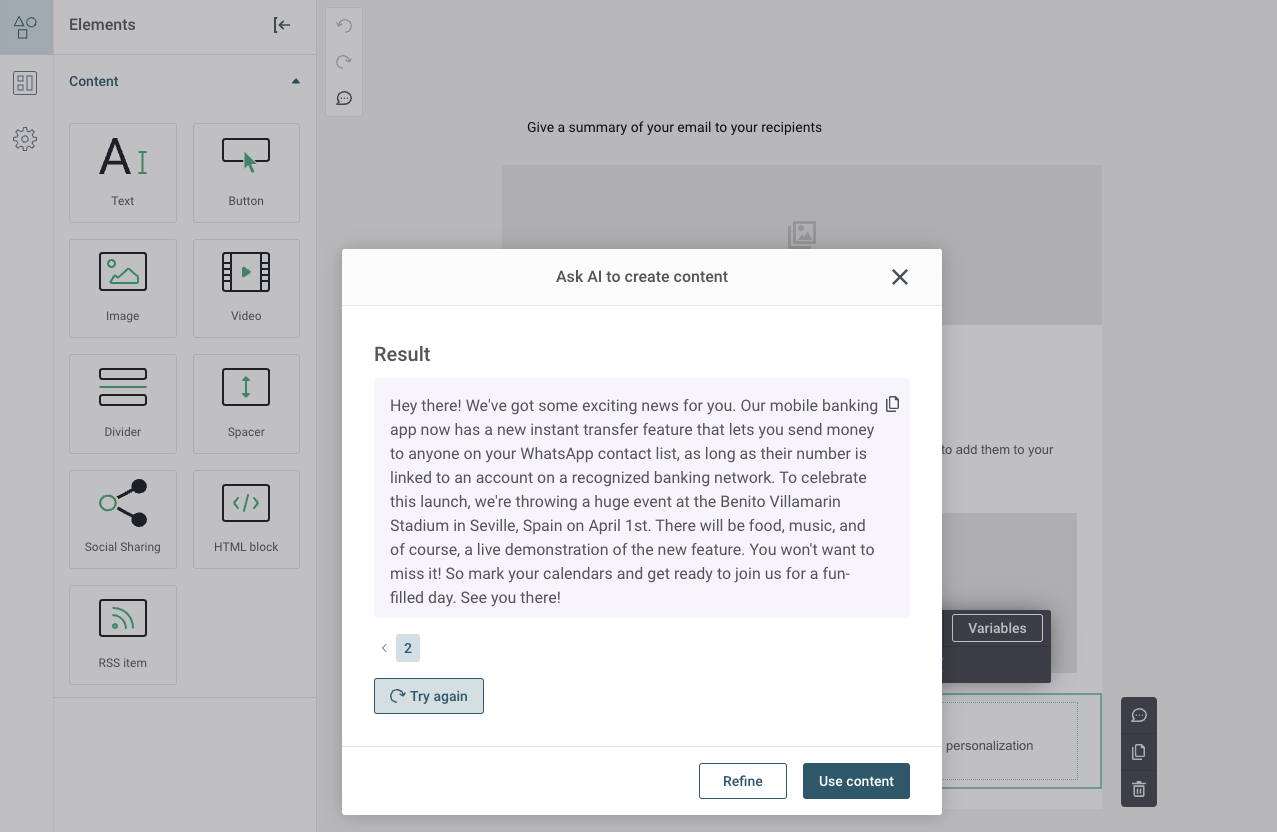
Webinar series
Email isn’t just a channel to promote new blog posts, eBooks, and bug updates. You can use to inform subscribers about upcoming webinars, too.
Unlike static content, webinars allow for real-time interaction with your audience. You can answer questions, address concerns, and build relationships with potential customers (Sinch Mailjet’s Email Academy series is a great example).
Let’s try a prompt for an upcoming webinar educating customers on how to get the most out of a new product feature.
AI writing prompt: Write a draft for a newsletter announcing an upcoming webinar that will show customers, step by step, how to use the new instant transfer feature for a mobile banking app. Transfers can be made to anyone on a user’s WhatsApp contact list if their number is linked to an account on a recognized banking network. The webinar will take place on March 26.
Here is the result generated from Sinch Mailjet’s AI Copy Generator tool after inputting the prompt:
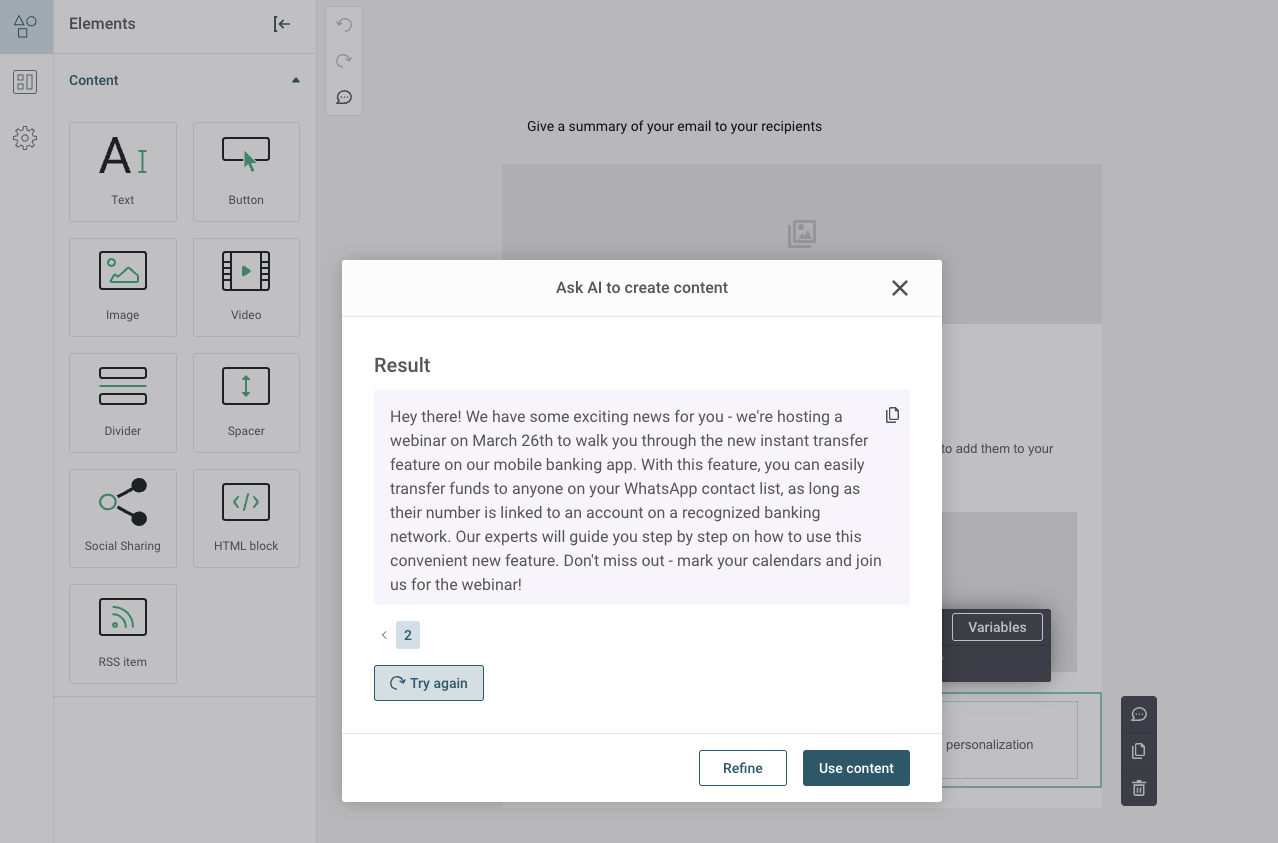
Reengagement campaign
If you’re new to the term, a reengagement email campaign is an email (or potentially series) specifically designed to win back inactive subscribers on your email list. These are people who signed up to receive your emails at some point but haven't opened or interacted with them recently.
Reengagement campaigns are great for several reasons:
Improve email deliverability: Having a high number of inactive subscribers can negatively impact your email deliverability rates. Reengagement campaigns help clean your list and ensure your emails reach engaged recipients.
Reignite interest: Subscribers signed up to your email list for a reason, right? Reengagement campaigns can help remind them why that was, either through incentives or offering valuable content.
Boost customer retention: Reactivating inactive subscribers is often easier and less expensive than acquiring new customers.
So, with that said let’s look at a potential AI writing prompt to input into our tool.
AI writing prompt: Write a reengagement newsletter targeting subscribers who haven’t interacted with our recent campaigns. The copy should ask what their preferences are and offer some sort of incentive for them reengaging.
Here is the result generated from Sinch Mailjet’s AI Copy Generator tool after inputting the prompt:
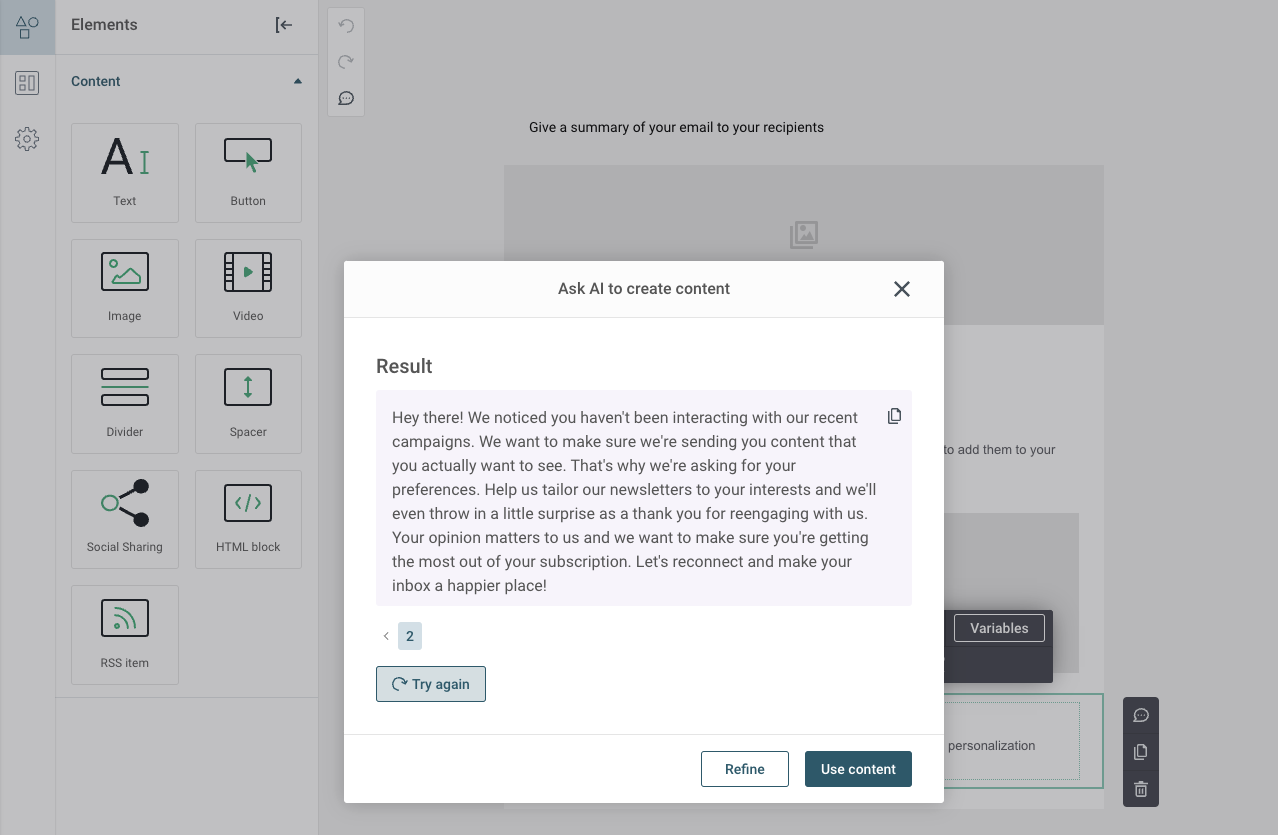
Create high-performance emails with Sinch Mailjet’s AI Copy Generator
Think you’ve got enough AI writing prompts on hand to give this a go? If so, great! Our built-in AI copy generator is now available to paying customers, embedded seamlessly into our email marketing software.
By using some of the prompt examples above, you can now easily craft engaging email subject lines, body copy, and CTAs in just seconds. The best part is you can do this directly within the platform itself – and in more than 20 different languages.
Just select the AI Copy Generator within Mailjet, type a descriptive prompt of the content you need, specify things like tone of voice and length, and let the tool get to work. You can also further refine your results, including incorporating your brand voice and adhering to your communication objectives.
